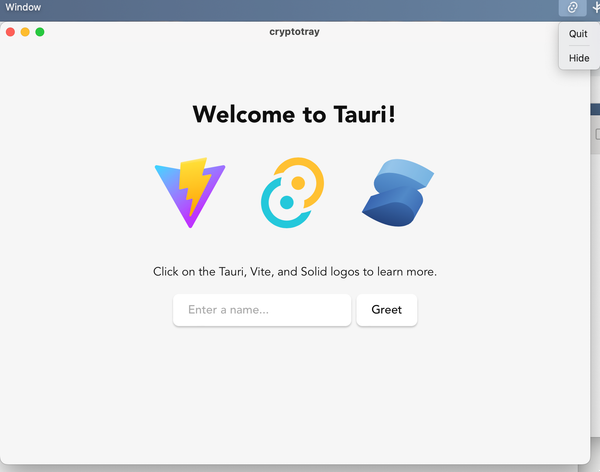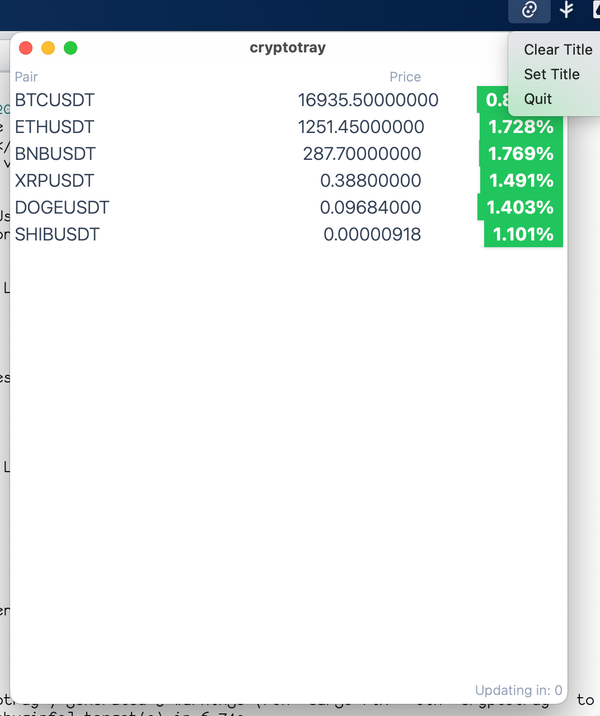Try Tauri
Sounds interesting and I decided to give it a try, and make a simple application for tracking cryptocurrency tickers from the Binance exchange.
Setup #
The first step is to install and create an application template.
We need rust and cargo in order to generate our application scaffold (there are many other options for generation but since I'm starting to learn rust I will stick with it.)
The easiest way to scaffold a new project is the create-tauri-app utility.
cargo install create-tauri-app
cargo create-tauri-app
✔ Project name · mycryptobar
? Choose your package manager ›
cargo
❯ pnpm
yarn
npmOn this step generator asking us about prefer package manager for our frontend, there are two options:
- for handling frontend with
rusttrough yew chosecargo - for handle frontend with
jstrough any modern js framework likevue,svelte,reactand so on choosepnpm,yarn,npm.
In my example I'll use pnpm as package manager, solidjs and tailwind framework.
Scaffold #
Generator create an application scaffold for us, there are two part frontend in our root folder and backend in src-tauri folder.
We will create system tray application and we need enable it in the src-tauri/Cargo.toml:
diff --git a/src-tauri/Cargo.toml b/src-tauri/Cargo.toml
index f05fce3..6434503 100644
--- a/src-tauri/Cargo.toml
+++ b/src-tauri/Cargo.toml
@@ -16,6 +16,7 @@ tauri-build = {version = "1.2", features = [] }
[dependencies]
serde_json = "1.0"
serde = { version = "1.0", features = ["derive"] }
+tauri = { version = "1.2.1", features = ["http-request", "icon-png", "system-tray"] }
[features]
# by default Tauri runs in production modeAdd tray configuration to src-tauri/tauri.conf.json:
diff --git a/src-tauri/src/main.rs b/src-tauri/src/main.rs
index e27813a..af057f4 100644
--- a/src-tauri/src/main.rs
+++ b/src-tauri/src/main.rs
@@ -3,6 +3,9 @@
windows_subsystem = "windows"
)]
+use tauri::SystemTray;
+use tauri::{CustomMenuItem, SystemTrayMenu, SystemTrayMenuItem};
+
// Learn more about Tauri commands at https://tauri.app/v1/guides/features/command
#[tauri::command]
fn greet(name: &str) -> String {
@@ -10,7 +13,17 @@ fn greet(name: &str) -> String {
}
fn main() {
+ let quit = CustomMenuItem::new("quit".to_string(), "Quit");
+ let hide = CustomMenuItem::new("hide".to_string(), "Hide");
+ let tray_menu = SystemTrayMenu::new()
+ .add_item(quit)
+ .add_native_item(SystemTrayMenuItem::Separator)
+ .add_item(hide);
+
+ let system_tray = SystemTray::new()
+ .with_menu(tray_menu);
tauri::Builder::default()
+ .system_tray(system_tray)
.invoke_handler(tauri::generate_handler![greet])
.run(tauri::generate_context!())
.expect("error while running tauri application");
diff --git a/src-tauri/tauri.conf.json b/src-tauri/tauri.conf.json
index eaac219..0dbc746 100644
--- a/src-tauri/tauri.conf.json
+++ b/src-tauri/tauri.conf.json
@@ -52,6 +52,10 @@
},
"updater": {
"active": false
+ },
+ "systemTray": {
+ "iconPath": "icons/icon.png",
+ "iconAsTemplate": true
},
"windows": [Now lets test it, run cargo tauri dev:

Frontend #
Lets add some frontend code, first part with styles. Install and generate tailwind our css framework:
pnpm install -D tailwindcss postcss autoprefixer
pnpm tailwindcss init -p
cat tailwind.config.js
/** @type {import('tailwindcss').Config} */
module.exports = {
content: [
"./index.html",
"./src/**/*.{js,ts,jsx,tsx}",
],
theme: {
extend: {},
},
plugins: [],
}A little bit css code for tailwind components src/style.css:
@tailwind base;
@tailwind components;
@tailwind utilities;Next step add solidjs code for out frontend, in src/App.jsx, in this code we create a simple table component to render the response from binance exchange:
import { invoke } from "@tauri-apps/api/tauri";
import Item from "./Item";
import { createSignal, createEffect } from "solid-js";
const timeTicker = 10;
function App() {
const [count, setCount] = createSignal(timeTicker);
const [items, setItems] = createSignal([]);
createEffect(() => {
const c = count()
setTimeout(async () => {
if (c === 0) {
const response = await invoke("get_binance_ticker")
setItems(response, { equals: false })
setCount(timeTicker)
return
}
setCount(c - 1);
}, 1000);
})
return (
<div class="grid grid-rows-2 grid-flow-row font-source h-screen bg-background p-1">
<div class="font-light">
<div class="grid grid-cols-4 gap-4 h-4 content-center text-xs text-slate-400">
<div class="col-span-2">Pair</div>
<div class="ml-auto">Price</div>
<div class="ml-auto">24h%</div>
</div>
<For each={items()}>
{(item) => <Item symbol={item.symbol} priceChangePercent={item.change} lastPrice={item.price}/>}
</For>
</div>
<div class="text-xs font-light text-slate-400">
</div>
<div class="text-xs font-light text-slate-400 ml-auto">
<div class="col-span-2">Updating in: {count()}</div>
</div>
</div>
);
}
export default App;Create a table item component src/Item.jsx
const buttonClass = "text-white font-bold uppercase shadow hover:shadow-md outline-none focus:outline-none ease-linear transition-all duration-150 px-2"
const greenButton = "bg-green-500 "
const redButton = "bg-red-500 "
export default function Item (props) {
return <div class="grid grid-cols-4 gap-4 text-base h-6 content-center text-slate-700">
<div class="col-span-2"><div>{props.symbol}</div></div>
<div class="ml-auto"><div>{props.lastPrice}</div></div>
<div class="ml-auto"><div class={(props.priceChangePercent.startsWith("-") ? redButton : greenButton) + buttonClass}>{props.priceChangePercent}%</div></div>
</div>
}Backend #
Now the magic part is to call our rust backend and fetch the prices from exchange, tauri provide a helper function for this case invoke, install that helper:
pnpm add @tauri-apps/apiAdd to our frontend code src/App.jsx:
import { invoke } from "@tauri-apps/api/tauri";
// some code here
const response = await invoke("get_binance_ticker")
// some code hereAnd the rust part, firstly add library to make http calls src-tauri/Cargo.toml:
...
reqwest = { version = "0.11.13", features = ["blocking", "json"] }
...Next add to rust code a tauri command get_binance_ticker which returns the response from binance exchange, in our frontend code we have invoke("get_binance_ticker") function call.
src-tauri/src/main.rs:
#![cfg_attr(
all(not(debug_assertions), target_os = "windows"),
windows_subsystem = "windows"
)]
use reqwest::Url;
use serde::{Deserialize, Serialize};
use tauri::{CustomMenuItem, Manager, SystemTray, SystemTrayEvent, SystemTrayMenu};
#[derive(Serialize, Deserialize, Debug)]
struct ApiResponse {
symbol: String,
#[serde(rename(deserialize = "lastPrice"))]
price: String,
#[serde(rename(deserialize = "priceChangePercent"))]
change: String,
}
#[tauri::command]
fn get_binance_ticker() -> Vec<ApiResponse> {
let url = "https://api.binance.com/api/v1/ticker/24hr?symbols=[%22BTCUSDT%22,%22BNBUSDT%22,%22ETHUSDT%22,%22XRPUSDT%22,%22DOGEUSDT%22,%22SHIBUSDT%22]";
let url = Url::parse(&*url).unwrap();
let res = reqwest::blocking::get(url).unwrap();
let items: Vec<ApiResponse> = res.json().unwrap();
println!("{:?}", items);
items
}
#[tauri::command]
fn set_title(app_handle: tauri::AppHandle, value: &str) {
#[cfg(target_os = "macos")]
app_handle.tray_handle().set_title(&value).unwrap();
}
fn create_tray(app: &tauri::App) -> tauri::Result<()> {
let tray_menu = SystemTrayMenu::new()
.add_item(CustomMenuItem::new("clear_title", "Clear Title"))
.add_item(CustomMenuItem::new("set_title", "Set Title"))
.add_item(CustomMenuItem::new("quit", "Quit"));
let handle = app.handle();
let tray_id = "cryptobar-tray".to_string();
SystemTray::new()
.with_id(&tray_id)
.with_menu(tray_menu)
.on_event(move |event| {
let tray_handle = handle.tray_handle_by_id(&tray_id).unwrap();
match event {
SystemTrayEvent::LeftClick {
position: _,
size: _,
..
} => {
println!("left click")
}
SystemTrayEvent::MenuItemClick { id, .. } => {
// let item_handle = tray_handle.get_item(&id);
println!("menu click");
match id.as_str() {
"quit" => {
// exit the app
handle.exit(0);
}
"clear_title" => {
#[cfg(target_os = "macos")]
tray_handle.set_title("").unwrap();
}
"set_title" => {
#[cfg(target_os = "macos")]
tray_handle.set_title("Tauri").unwrap();
}
_ => {}
}
}
_ => {}
}
})
.build(app)
.map(|_| ())
}
fn main() {
tauri::Builder::new()
.setup(|app| {
create_tray(app)?;
Ok(())
})
.on_system_tray_event(move |app, event| match event {
SystemTrayEvent::LeftClick { position, size, .. } => {
let w = app.get_window("main").unwrap();
let visible = w.is_visible().unwrap();
if visible {
w.hide().unwrap();
} else {
w.show().unwrap();
w.set_focus().unwrap();
}
}
_ => {}
})
.on_window_event(|event| match event.event() {
tauri::WindowEvent::CloseRequested { api, .. } => {
// don't kill the app when the user clicks close. this is important
// event.window().hide().unwrap();
// api.prevent_close();
}
tauri::WindowEvent::Focused(false) => {
// hide the window automatically when the user
// clicks out. this is for a matter of taste.
// event.window().hide().unwrap();
}
_ => {}
})
.invoke_handler(tauri::generate_handler![set_title, get_binance_ticker])
.run(tauri::generate_context!())
.expect("error while running tauri application");
}Overview #
If all steps above was successfull now we have a very basic GUI application build with tauri.

You can play with tray functionalities, create multiwindow application and ship it for many platforms.
Happy coding!